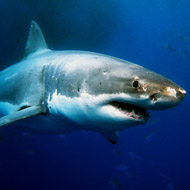
Australian government may use findings to delist great whites
New research on great white sharks may be employed by the Australian government to show just cause for delisting the species as threatened or ordering a cull.
According to The Guardian, the warning came from Green Party senator Peter Whish-Wilson, who is leading a committee enquiry into shark reduction and deterrence.
Last week, the Liberal Party passed a motion to protect ocean users by killing great white sharks. The move followed the death of 17-year-old surfer Laetitia Brouwer, who was attacked by a great white off the West Australian coast.
In response to the motion, environment secretary Josh Frydenberg said that he would need advice from his department’s threatened species committee before great whites could be delisted.
Research organisation CSIRO are now working to assess the numbers of great whites on the east and west coast and are expected to report their findings later this year.
Whish-Wilson said that while Australia needs a population study to find out the number of great white sharks, the “recent politicisation of tragic shark incidents” suggested that it could be used as a reason to end their protected status.
According to The Guardian, he fears that the government may use the study to protest the need for a cull on sharks as an “interim measure.” Any recovery in numbers may be used as a reason to carry out the cull, without breaching international obligations, he said.
He also responded to other methods highlighted by Frydenberg to improve human safety - such as drumlines and nets.
Whish-Wilson argues that such measures are not workable, especially in remote locations where surfers have already been attacked. Instead, he supports the use of deterrent devices, like “shark shields” that send out electric currents around a surfer’s board.
“I think we’re at a real turning point – people don’t want to see sharks harmed, but they want to achieve beach safety properly and sustainably,” he said.
The controversial issue will be debated next month at the Liberal Party’s federal council in Sydney.



 The Veterinary Medicines Directorate (VMD) is inviting applications from veterinary students to attend a one-week extramural studies (EMS) placement in July 2026.
The Veterinary Medicines Directorate (VMD) is inviting applications from veterinary students to attend a one-week extramural studies (EMS) placement in July 2026.